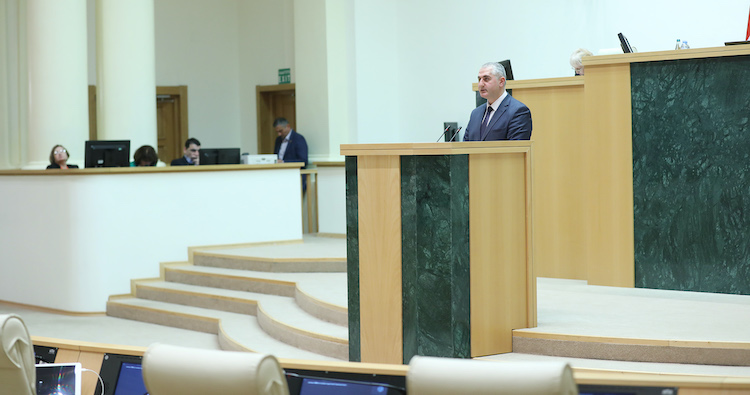Finance Minister: double-digit growth has enabled “full recovery” of pandemic losses

Georgian Finance Minister Lasha Khutsishvili said the domestic economy would “continue to grow significantly” after achieving double-digit growth over the past two years. Photo: Finance Ministry
Georgian Finance Minister Lasha Khutsishvili on Wednesday said the domestic economy would “continue to grow significantly” after achieving double-digit growth over the past two years, a dynamic he said had allowed the Government to “fully recover” the losses caused by Covid-19 and return to pre-pandemic levels this year.
Speaking at the Parliament to present an updated draft state budget for 2024, Khutsishvili said the Government had been able to “fully restore both macroeconomic indicators and fiscal parameters” in a “record time” and added Georgia had been distinguished by “fiscal discipline for years”.
This is what allowed us to respond to the challenge of the pandemic with appropriate fiscal spending, and we managed to do all this without hindering the post-crisis recovery”, he said.
The Minister compared macroeconomic parameters of the country to EU member and candidate countries by saying Georgia not only had a “better position” than their average indicators, but was in an “advanced position in a number of directions”.
In terms of economic growth rate, Georgia ranks first among EU member and candidate countries; with its low inflation rate Georgia ranks third among EU member and candidate countries; according to low government debt [it] ranks 10th among EU member and candidate countries and is ahead of 26 countries; according to the [size] of the budget deficit Georgia ranks 16th among the EU member and candidate countries and is ahead of 20 countries", Khutsishvili told MPs.
The Minister noted this year the economy was expected to reach a 6.5 percent growth, while the forecast for 2024 was 5.2 percent.
By the end of 2023, gross domestic product per capita will exceed $8,000, and by 2027, under the conditions of five percent economic growth, it will reach almost $11,000 dollars. The International Monetary Fund has projected that in 2027 the volume of GDP per capita [for the country], taking into account the purchasing power, will reach $30,000 dollars”, he said.
Khutsishvili said the “main task” was to ensure macroeconomic stability for maintaining a high rate of growth and added the high current account deficit had been the “main challenge” of macroeconomic stability in the country historically.
As a result of the reforms carried out in recent years, in fact, we have a decrease in the current account deficit every year. By 2022, the current account balance is set at a record low of 4.6 percent. We expect to maintain the deficit at a similar level in 2023”, he said.
The Minister also noted the “record high” foreign direct investments, saying they had reached $2.1 billion in 2022.
Historically high indicators have been recorded in 2023 as well - in the first half of the year, the inflow of FDI amounted to $1.72 billion, exceeding last year's indicator by 10.9 percent", he said.
Khutsishvili said revenue from international tourism also continued to grow.
In the first nine months of 2023, we received the same amount of revenue from tourism as in the whole of 2019, and 28 percent more than in the first nine months of 2019. We expect tourism to continue to make a positive contribution in the coming years as well, both to economic growth and to the improvement of the foreign balance", he pointed out.
The Minister noted a “sharp stabilisation” of inflation had been observed since the second half of the year, which, according to him, was facilitated by macroeconomic policy and fiscal consolidation, as well as stabilisation of international prices, introduction of the reference price mechanism for medicines and access to the Turkish market for importing medical drugs.
Khutsishvili also spoke about government debt, the level of which exceeded the 60 percent mark in 2020 but was expected to decrease to 38 percent by 2024.
This is a 20 percentage point reduction in the debt level in three years, which is truly a rare exception in the world. We have shown a rare example of fiscal consolidation, where in two years the debt was fully restored to a safe level of below 40 percent, and at the same time we did not hinder economic growth. Moreover, we had double-digit economic growth", he told lawmakers.
Khutsishvili also said it was important to continue fiscal consolidation despite the positive economic parameters in order to keep the government debt at a “safe level”, and simultaneously mobilise resources to finance large infrastructure projects planned for the coming years.
 Tweet
Tweet  Share
Share